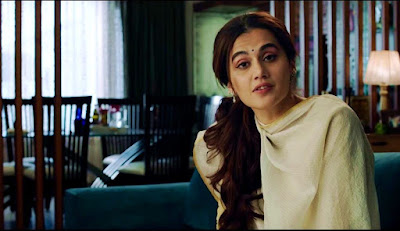Thappad Movie Review - An Unstated Rule of Marriage.
When Amrita's (Taapsee Pannu) extremely ambitious husband, Vikram (Pavail Gulati), lands a huge slap across her face at a gathering meant to celebrate his success in the corporate world, her world comes crashing down. Will Amrita, whose entire life has revolved around Vikram's wishes, aspirations, and dreams, take a stance and speak out against this public humiliation? Will she dismiss it as a one-time occurrence, forgive him, and move on? Or will this cause her to reconsider her views on life and marriage?
Thappad Review:Amrita came from a loving and supportive family in Delhi, and she was trained in Indian classical dance. Her life may have gone in a different direction, but she dreamed of being the best housewife ever, even if it meant sacrificing her passion for dance. Vikram is a doer who has his mind and heart set on achieving his objectives and will go to any length to achieve them. However, he quickly realises that his lofty ambitions are about to be dashed, blaming it on office politics. Vikram does the unthinkable: he unleashes his bottled-up rage on his devoted wife in the form of a tremendous slap witnessed by loved ones on both sides. And this sets off a nasty, emotional conflict that extends beyond domestic violence. While Amrita ponders and questions her life choices and marriage as a result of the uncalled for occurrence, Vikram remains in denial and wonders how "just one slap" has turned into a life-changing event.
Anubhav Sinha's two-hour-and-twenty-minute social play, which is aimed at a culture that rarely discusses the emotional and psychological ramifications of domestic abuse, is expected to elicit debates and conversations on a variety of topics. One slap at a party turns into a full-fledged discussion about the unspoken rules of marriage (where women are constantly reminded that ki ghar zyada zaruri hain and that their actions will always be determined by log kya kehenge) and whether it is acceptable for a husband to get away with one "casual thappad" because he was fuming with rage.
The film takes its time depicting the complexities of Amrita-planned Vikram's marriage and how the two of them manage to fit in with each other's financially disadvantaged, yet likeable, families. Sure, Vikram adores his wife, but he has created a monster out of his professional ambitions, which the better half enthusiastically supports and nurtures. Even before the conflict, Taapsee can be seen drafting plans for a "large blue door" at their future London property. Naturally, when the slap occurs, her life is turned upside down, and both sides of the family are split on what is right, wrong, and how much is too much, as well as the marital customs in our Indian environment. Regardless of the numerous points of view presented to her, Amrita is tenacious and resolves to channel her inner fighter and stand up for what she truly believes in-that even one slap is excessive and unacceptable.
"Thappad" is more than a pointless tirade about borderline domestic violence; it exposes a woman's years of indoctrination at the hands of her own family and the society in which she lives. Other women in focus include one who is bearing the brunt of a family's name and legacy, one who is hung up on the idea that marriage is the ultimate destination, one who comes from a poorer section of society and is compelled to believe that being thrashed by the husband is the norm, and one who has loved and lost a fine husband and is now struggling to find a replacement who outdoes the former. Sinha weaves all of these stories together and juxtaposes them at key points without being overbearing. As the dramatic contrast between their lifestyles unfolds, the nuance works well.
Taapsee Pannu, who plays a meek wife who endures an ocean of change within her, is a fireball in this drama. In one scenario, where she bids farewell to a key character, Taapsee delivers a statement that is therapeutic to the heart. Her performance is restrained, yet she displays a range of emotions — grief, disdain, regret, and wrath — in every scene without saying too much. We don't know what more to say if it wasn't a spectacular performance.
Pavail Gulati gives a fantastic portrayal as a dedicated corporate slave with lofty life ambitions. You'll want to despise him for his failings, yet he's just as complex as the rest of them. Amrita's father, Kumud Mishra, stands out as a passionate defender of his daughter, and he is often the only one who stands up for her. Mishra's persona reaffirms why many daughters regard their father as a hero. Tanvi Azmi and Ratna Pathak Shah, who play Amrita's mother-in-law and mother, respectively, nail their roles as torchbearers for matriarchal attitudes and attempt to teach it to the housewives. Maya Sarao, who plays high-profile lawyer Nethra Jaisingh, is, however, the film's weakest link. Not that she's horrible, but her performance is eclipsed by some truly outstanding performances.
The film's music (by Anurag Saikia) is beautifully gloomy in tone and flows seamlessly with the storey. In this strongly worded social drama, it's reasonable to state that Anubhav Sinha has given his best performance. He deserves admiration for his nuanced portrayal of the film's numerous characters, their greys, complexity, and challenges, without ever becoming overwhelming or pushing too hard to make a point. Nonetheless, the film makes a strong argument and leaves you with something to think about. Sinha and Mrunmayee Lagoo's outstanding and nuanced script deserves special recognition because it is what elevates the film.
To summarise, "Thappad" is a silent rebuke to our society's long-held idea that shaadi mein sab kuch chalta hain. But, honestly, does it have to be that way? And it's about this that we need to start discussing right now!










0 Comments
Please do not enter any spam link in the comment box.